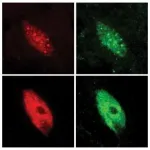COVID-19 bereavement care lacking for ethnic minorities
2021-06-30
University of Leeds news
Embargo: Wednesday 30 June, 7pm GMT
Bereavement care lacking for ethnic minorities
Grieving friends and relatives from ethnic minority backgrounds are suffering from a lack of appropriate help to cope with the loss of a loved one, especially during the COVID-19 pandemic, researchers say.
And the scarcity of data on the services that are available means providers do not know how support should be delivered to ensure they are suitable for different groups of people.
The researchers, led by the University of Leeds and the University of Sheffield, reviewed evidence on UK bereavement care for ethnic minority ...
New research moves novel gene therapy for heart failure closer to the clinic
2021-06-30
Research at Baylor College of Medicine, the Texas Heart Institute and collaborating institutions is moving a novel promising gene therapy to treat heart failure closer to the clinic.
Published in Science Translational Medicine, the study showed that knocking down the Hippo signaling pathway in cardiomyocytes in the hearts of pigs after they had a heart attack, resulted in heart tissue renewal and improved function when compared with pig hearts in which the Hippo signaling pathway was not modified. Given that the pig's heart is considered a valuable model to study the human heart, the findings suggest that this gene therapy may be useful in treating human heart failure.
Heart failure remains the leading cause of mortality in the western ...
Thermal waves observed in semiconductor materials
2021-06-30
A study published in Science Advances reports on the unexpected observation of thermal waves in germanium, a semiconductor material, for the first time. This phenomenon may allow a significant improvement in the performance of our electronic devices in a near future. The study is led by researchers from the Institute of Materials Science of Barcelona (ICMAB, CSIC) in collaboration with researchers from the Universitat Autònoma de Barcelona, and the University of Cagliari.
Heat, as we know it, originates from the vibration of atoms, and transfers by diffusion at ambient temperatures. Unfortunately, ...
Scientists identify 160 new drugs that could be repurposed against COVID-19
2021-06-30
Cambridge scientists have identified 200 approved drugs predicted to work against COVID-19 - of which only 40 are currently being tested in COVID-19 clinical trials.
In a study published today in Science Advances, a team led by researchers at the University of Cambridge's Milner Therapeutics Institute and Gurdon Institute used a combination of computational biology and machine learning to create a comprehensive map of proteins that are involved in SARS-CoV-2 infection - from proteins that help the virus break into the host cell to those generated as a consequence of infection. By examining this network using artificial intelligence (AI) approaches, ...
Monkeys also learn to communicate
2021-06-30
Language distinguishes us humans; we learn it through experience and social interactions. Especially in the first year of life, human vocalizations change dramatically, becoming more and more language-like. In our closest relatives, non-human primates, language development was previously thought to be largely predetermined and completed within the first few weeks after birth. In a behavioral study now published, researchers from the German Primate Center, the University of Tübingen and the Rockefeller University New York were able to show that the infantile development of vocalizations in common marmosets also includes an extended flexible phase, without ...
Autonomous excavators ready for around the clock real-world deployment
2021-06-30
Researchers from Baidu Research Robotics and Auto-Driving Lab (RAL) and the University of Maryland, College Park, have introduced an autonomous excavator system (AES) that can perform material loading tasks for a long duration without any human intervention while offering performance closely equivalent to that of an experienced human operator.
AES is among the world's first uncrewed excavation systems to have been deployed in real-world scenarios and continuously operating for over 24 hours, bringing about industry-leading benefits in terms of enhanced safety and productivity.
The researchers described their methodology in a research paper published ...
Conservatives' sensitivity to pandemic threat suppressed by distrust of science, media
2021-06-30
Researchers studying the intersection of politics and psychology have long documented a link between threat sensitivity and social conservatism: People who are more socially conservative tend to react more strongly to threats. Conversely, those who are more socially liberal tend to be less sensitive to threats, viewing the world as a generally safe place and embracing change to explore new possibilities.
These findings have held across a variety of events, but during the pandemic, U.S. polls show that Democrats, who tend to be more liberal, have generally been more concerned about the COVID-19 threat than ...
Protein 'big bang' reveals molecular makeup for medicine and bioengineering
2021-06-30
URBANA, Ill. - Proteins have been quietly taking over our lives since the COVID-19 pandemic began. We've been living at the whim of the virus's so-called "spike" protein, which has mutated dozens of times to create increasingly deadly variants. But the truth is, we have always been ruled by proteins. At the cellular level, they're responsible for pretty much everything.
Proteins are so fundamental that DNA - the genetic material that makes each of us unique - is essentially just a long sequence of protein blueprints. That's true for animals, plants, ...
Study finds breast cancer's response to tumor stiffness may predict bone metastasis
2021-06-30
In cases of breast cancer, bone metastasis - when cancer cells spread to new sites in the bone - causes the most breast cancer-related harm and is often incurable in advanced disease. A new study by University of Arizona Health Sciences researchers found that cancer cells become more aggressive when exposed to tissue stiffening and that these changes persist over time.
Tumor stiffening, which develops as diseased breast tissue becomes fibrotic, plays a major role in how breast cancer cells spread throughout the body. The paper, "Breast tumor stiffness instructs bone metastasis via maintenance of mechanical conditioning," published today in the journal Cell Reports, ...
Business professors study ideal responses to ransomware attacks
2021-06-30
A pair of College of Business professors and their doctoral student at The University of Texas at Arlington are exploring how ransomware attacks sometimes pit organizations against the law enforcement agencies trying to protect them.
Kay-Yut Chen, Jingguo Wang and Yan Lang are authors of a new study in the journal Management Science titled "Coping with Digital Extortion: An Experimental Study on Benefit Appeals and Normative Appeals." Chen and Wang are professors of information systems and operations management at UTA. Lang is a doctoral student in the department.
A ransomware attack is like a cyber hijacking, with criminals infiltrating and seizing an organization's data or computer systems and ...
Knowledge of nurses for pain management of patients on maintenance hemodialysis
2021-06-30
In hospitals, we know that the nurses are the first to deal with patients in pain. For any ailment, including patients needing hemodialysis, the knowledge of pain management, the nurses have, allow them to provide optimal pain management.
This qualitative study aims to explore the experiences, perceptions, and beliefs of nurses serving in the hemodialysis unit in terms of pain management practices. The study helped identify the educational needs of the nurses to improve pain management in practice. A subjective sample of 16 nurses working in four out-patient hemodialysis units in Amman, Jordan, was hired for this research. Using semi-structured interviews, the data was collected.
The study found five themes and fifteen subcategories ...
SLAS Discovery's July special edition 'Drug discovery targeting COVID-19' now available
2021-06-30
Oak Brook, IL - The July edition of SLAS Discovery is a Special Edition featuring the cover article, "Development of a High-Throughput Screening Assay to Identify Inhibitors of the SARS-CoV-2 Guanine-N7-Methyltransferase Using RapidFire Mass Spectrometry" by Lesley-Anne Pearson, Charlotte J. Green, Ph.D., De Lin, Ph.D., Alain-Pierre Petit, Ph.D., David W. Gray, Ph.D., Victoria H. Cowling, Ph.D., and Euan A. F. Fordyce, Ph.D., (Drug Discovery Unit, School of Life Sciences, University of Dundee, Dundee, UK).
In January 2021, a survey of immunologists, infectious-disease researchers and virologists found that 90% of respondents believe SARS-CoV-2 will become endemic, continuing to circulate in pockets of the global population for years to come. Even as vaccines are ...
New articles for Geosphere posted online in June
2021-06-30
Boulder, Colo., USA: GSA's dynamic online journal, Geosphere, posts articles online regularly. Locations and topics studied this month include the central Appalachian Mountains; fossil pollen in Colombia; the precision and accuracy of model analyses; the Bone Spring Formation, Permian Basin, west Texas; and the geochronology of modern river sediment in south-central Alaska. You can find these articles at https://geosphere.geoscienceworld.org/content/early/recent .
Spatially variable syn- and post-Alleghanian exhumation of the central Appalachian Mountains from zircon (U-Th)/He thermochronology
Luke C. Basler; Jaclyn S. Baughman; Michelle L. Fame; Peter J. Haproff
Abstract: To assess spatial and temporal patterns of Phanerozoic orogenic burial and subsequent ...
Do 'Made in USA' claims make a difference in marketing results?
2021-06-30
Key Takeaways:
Research reveals consumer demand declines when product packaging and marketing materials removed the claim, "Made in USA" and increase when the claim was featured.
The impact on sales is insufficient to convince some companies to manufacture more products in the United States but enough to incentivize companies to make deceptive "Made in USA" claims.
CATONSVILLE, MD, June 30, 2021 - Pick up any product in just about any store and you're likely to find information that indicates the country of origin of the product. The U.S. Federal Trade Commission (FTC) requires this for any imported product, but not for products made in the United States. When you see the words "Made in USA" on a product, it's purely for marketing purposes. So, does it work?
According to a ...
How plants quickly adapt to shifting environmental conditions
2021-06-30
LA JOLLA--(June 30, 2021) Scientists--and gardeners--have long known that plants grow taller and flower sooner when they are shaded by close-growing neighbors. Now, for the first time, researchers at the Salk Institute have shown the detailed inner workings of this process.
The study, published June 17, 2021, in Nature Genetics, offers a new understanding of how gene activity directs plant growth, and how quickly plants respond to their environment--with shifting light conditions triggering molecular changes in as little as five minutes. The findings provide insights ...
Machine learning helps in predicting when immunotherapy will be effective
2021-06-30
When it comes to defense, the body relies on attack thanks to the lymphatic and immune systems. The immune system is like the body's own personal police force as it hunts down and eliminates pathogenic villains.
"The body's immune system is very good at identifying cells that are acting strangely. These include cells that could develop into tumors or cancer in the future," says Federica Eduati from the department of Biomedical Engineering at TU/e. "Once detected, the immune system strikes and kills the cells."
Stopping the attack
But it's not always so straightforward as tumor cells can develop ways to hide themselves from the immune system.
"Unfortunately, tumor cells can block the ...
Antibiotic-resistant bacteria found in cattle
2021-06-30
Growing resistance to our go-to antibiotics is one of the biggest threats the world faces. As common bacteria like strep and salmonella become resistant to medications, what used to be easily treatable infections can now pose difficult medical challenges.
New research from the University of Georgia shows that there may be more antimicrobial-resistant salmonella in our food animals than scientists previously thought.
Using technology she developed, UGA researcher Nikki Shariat and Amy Siceloff, a first-year doctoral student in UGA's Department of Microbiology, found that traditional culturing methods used to test livestock for problematic bacteria often miss drug-resistant ...
Have a pandemic plan? Most people did not
2021-06-30
Since the onset of the COVID-19 pandemic last year, medical experts have stressed the importance of having a plan in the event of a positive test result. Where should you self-isolate? Do you have personal protective equipment for family members? Who should you notify about your diagnosis? An overwhelming 96% of healthy, educated adults surveyed by University of Houston researchers in the early stages of the pandemic did not have a comprehensive plan in mind, while 62% didn't have a plan at all.
"What that suggests is that it was difficult even for very high functioning people to digest and use all the complex information that was quickly emerging about ...
COVID-19 in Europe and travel: Researchers show the important role of newly introduced lineages in COVID-19 resurgence after last summer
2021-06-30
Following the first wave of SARS-CoV-2 infections in spring 2020, Europe experienced a resurgence of the virus starting late summer. Although it appears clear that travel had a significant impact on the circulation of the virus, it remains challenging to assess how it may have restructured and reignited the epidemic in the different European countries.
In a new study published in the journal Nature this June 30th, 2021, Philippe Lemey - Rega Institute, KU Leuven, Simon Dellicour - SpELL, Spatial Epidemiology Lab, Université Libre de Bruxelles, and their collaborators, built a phylogeographic model to assess how newly introduced viral lineages, as opposed to ...
Fairer finance could speed up net zero for Africa by a decade
2021-06-30
Levelling up access to finance so that poorer countries can afford the funds needed to switch to renewable energy could see regions like Africa reaching net zero emissions a decade earlier, according to a study led by UCL researchers.
Access to finance (credit) is vital for the green energy transition needed to reduce global greenhouse gas emissions, as laid out in the Paris Agreement. But access to low-cost finance is uneven, with the cost of securing capital to help reach net zero differing substantially between regions.
Modelling created for the study, Higher cost of finance exacerbates a climate investment trap in developing economies, published in Nature Communications, ...
MD Anderson research highlights for June 30, 2021
2021-06-30
HOUSTON - The University of Texas MD Anderson Cancer Center's Research Highlights provides a glimpse into recently published studies in basic, translational and clinical cancer research from MD Anderson experts. Current advances include expanded use of a targeted therapy for a new group of patients with leukemia, molecular studies yielding novel cancer therapeutic targets, insights into radiation therapy resistance and a community intervention to reduce cervical cancer rates.
Using acalabrutinib as initial treatment for chronic lymphocytic leukemia
Chronic lymphocytic leukemia (CLL) is a cancer that occurs in the blood, bone marrow, lymph nodes, liver and spleen. It is the most common leukemia in adults, and while there are treatments ...
Repairing 'broken' hearts -- new promising surgical technique for heart attacks
2021-06-30
Heart attack, medically known as myocardial infarction (MI), is a common heart condition. MI is caused by problems in blood supply to parts of the heart. In severe cases, MI could be accompanied by ruptures in the wall separating different parts of the heart, such as in the ventricular septum (a wall that separates the right ventricle that pumps deoxygenated blood to the lungs for oxygenation, from the left ventricle that pumps oxygenated blood to rest of the body). Not surprisingly, without appropriate surgical intervention, a VSR due to MI increases the chances of death.
Current surgical techniques ...
'Plugging in' to produce environmentally friendly bioplastics
2021-06-30
Bioplastics -- biodegradable plastics made from biological substances rather than petroleum -- can be created in a more economical and environmentally friendly way from the byproducts of corn stubble, grasses and mesquite agricultural production, according to a new study by a Texas A&M AgriLife Research scientist.
green tractor pulling a red cart through a field of bioenergy sorghum that is taller than the tractor
A bioenergy sorghum crop is harvested near College Station. (Texas A&M AgriLife photo)
This new approach involves a "plug-in" preconditioning process, a simple adjustment for biofuel refineries, said Joshua Yuan, Ph.D., AgriLife Research scientist, ...
Digging into the molecules of fossilized dinosaur eggshells
2021-06-30
Dinosaurs roamed the Earth more than 65 million years ago, and paleontologists and amateur fossil hunters are still unearthing traces of them today. The minerals in fossilized eggs and shell fragments provide snapshots into these creatures' early lives, as well as their fossilization processes. Now, researchers reporting in ACS Earth and Space Chemistry have analyzed the molecular makeup of fossilized dinosaur eggshells from Mexico, finding nine amino acids and evidence of ancient protein structures.
Current research indicates that all dinosaurs laid eggs, though most haven't survived the test of time. And because whole eggs and shell fragments are very rare fossils, their mineral composition ...
University of Cincinnati screening program contributes to increase in HIV diagnoses
2021-06-30
Newly published research shows that a screening program in the University of Cincinnati Medical Center Emergency Department helped detect an outbreak of HIV among persons who inject drugs in Hamilton County, Ohio, from 2014-18.
The study was published in PLOS ONE.
The results of the study highlight UC contributions to public health surveillance as yet another reason why emergency departments should be screening for undiagnosed HIV infections, according to Michael Lyons, MD, associate professor in the Department of Emergency Medicine at the UC College of ...
[1] ... [2159]
[2160]
[2161]
[2162]
[2163]
[2164]
[2165]
[2166]
2167
[2168]
[2169]
[2170]
[2171]
[2172]
[2173]
[2174]
[2175]
... [8821]
Press-News.org - Free Press Release Distribution service.





